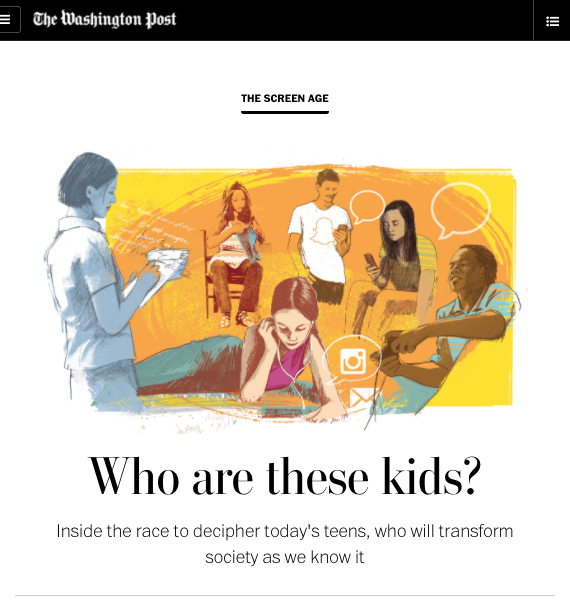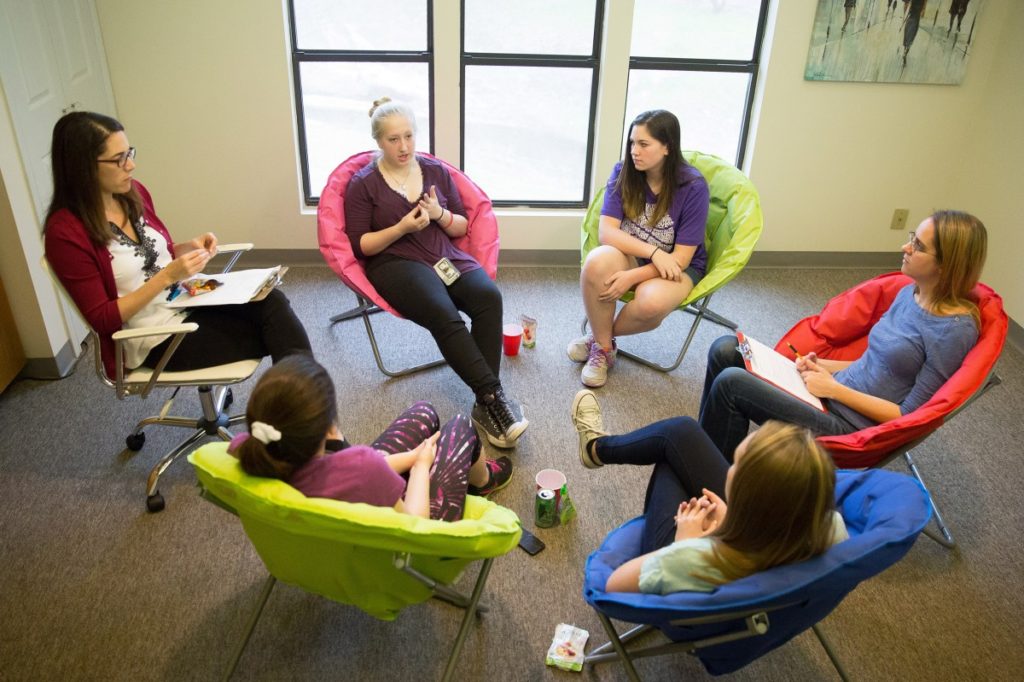
The feature story on Generation Z (aka Gen Z and iGen) was published in The Washington Post print edition and online on May 25, 2016.

Researchers from The Center for Generational Kinetics, Denise Villa, Ph.D., and Elli Denison, Ph.D., lead a focus group in Austin, Texas with members of Generation Z.

Researchers from The Center for Generational Kinetics, Denise Villa, Ph.D., and Elli Denison, Ph.D., lead a focus group in Austin, Texas with members of Generation Z.
Washington Post Article - Who Is Gen Z?
WASHINGTON POST FEATURE STORY ON GENERATION Z
“I lost my phone for a week once, and I had three thousand messages,” 11-year-old Molly announces with a dramatic flourish. This quote and much more were part of a landmark research study on Gen Z led by The Center for Generational Kinetics.
The Washington Post was on hand to observe The Center’s research process and focus group interviews with Gen Z. The article WaPo published includes behind-the-scenes photos at The Center and some very interesting commentary from the Gen Z participants.
Click here to read the entire article! Below is another excerpt:
DIFFERENT, BUT HOW?
It might seem like the same age-old dilemma: grown-ups struggling to understand Kids These Days. But there is a new sense of urgency when it comes to this generation of post-millennial teens, because they represent a significant turning point in societal evolution. Society and technology are always taking big leaps forward, and these leaps often feel alarmingly unprecedented — plenty of people predicted that television would turn us into a society of slack-jawed zombies — but many researchers agree that this generational pivot actually is unprecedented.
What does that mean for society at large? The Center for Generational Kinetics has more than 100 high-profile clients — financial institutions, restaurants, car manufacturers, fashion retailers, education groups, tourism companies, policymakers — who want to find out. And the sooner the better: This fall, the older members of Gen Z will be able to vote for the first time (only 26 percent of them say that they trust elected officials, according to the center’s research). By 2019, tens of millions of Gen Z’ers will enter the workforce. And by 2020, the young adults will wield roughly $3 trillion in purchasing power.
Clearly, there is money to be made mining the propensities of this group.
“People are trying to get the inside scoop on this generation,” says Jason Dorsey, The Center’s Co-Founder and President. “They come to us saying, ‘We can already tell they’re different, but we don’t know how different, and we don’t know what to do about it.’”
Social trends, especially those driven by technology, ripple from the youngest generation to the oldest, Dorsey says. Automakers must determine what built-in technology future drivers will expect. Advertisers must realize that their target audience is watching YouTube instead of live TV. If Gen Z’ers prefer to shop on their phones and choose to attend college online — and do not feel that it is necessary to conduct a job interview in person or work in an office building — then the broader culture must respond and adapt, he says.
Last year, the research company — which also gathers data about Baby Boomers, Gen X, and Millennials — launched a national survey to learn more about how Gen Z communicates and uses technology. The findings confirmed trends and illuminated a few new ones: Yes, this generation communicates almost entirely through screens and not always with actual words (GIFs, videos, and emoji also do the trick). Gen Z’ers are less idealistic and more thrifty than Millennials, having grown up in the twin shadows of the recession and student debt crisis. When it comes to privacy on social media sites such as Instagram, Snapchat, Tumblr, or Twitter, the survey showed that teens are far less guarded than Millennials and Gen X’ers. Members of Gen Z think that everyone should get a smartphone at age 13 and that it is acceptable to use it basically anywhere — at a family dinner, during a religious service, even at weddings (even their own weddings, the survey shows.)
And that is just scraping the surface. This is one national survey of 1,250 people, Denison says, and there is not a ton of research out there otherwise — Gen Z is still largely uncharted territory.
GEN Z IS HERE
Gen Z is about to change everything. This fast emerging generation, currently ages 21 and under, is bringing unprecedented challenges or rare opportunities—depending on which actions you take now. Forward-thinking leaders who want to make the most of this once-in-a-generation opportunity need research-based insights and actionable strategies. That’s exactly what The Center provides.
Gen Z is about to change everything. This fast emerging generation, currently ages 21 and under, is bringing unprecedented challenges or rare opportunities—depending on which actions you take now. Forward-thinking leaders who want to make the most of this once-in-a-generation opportunity need research-based insights and actionable strategies. That’s exactly what The Center provides.
Contact us for more info.
Contact The Center
To help you unlock the power of generations